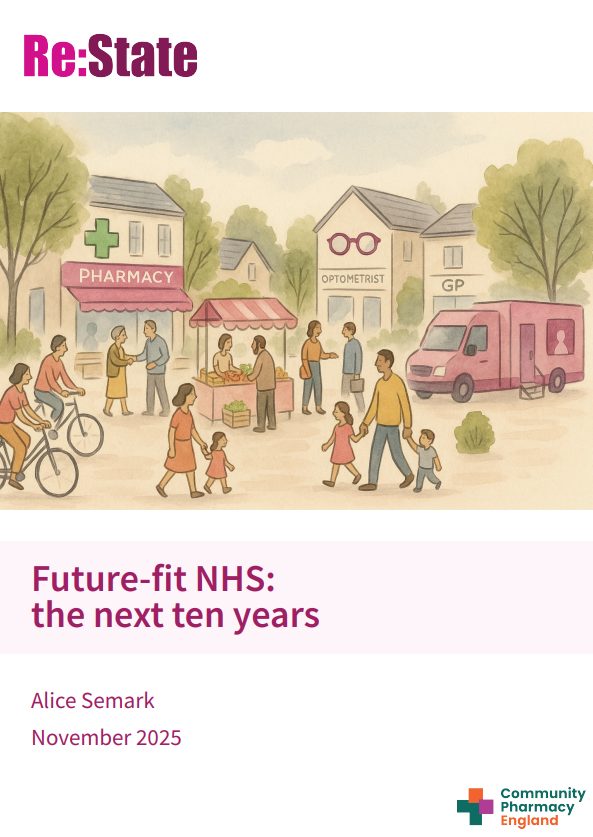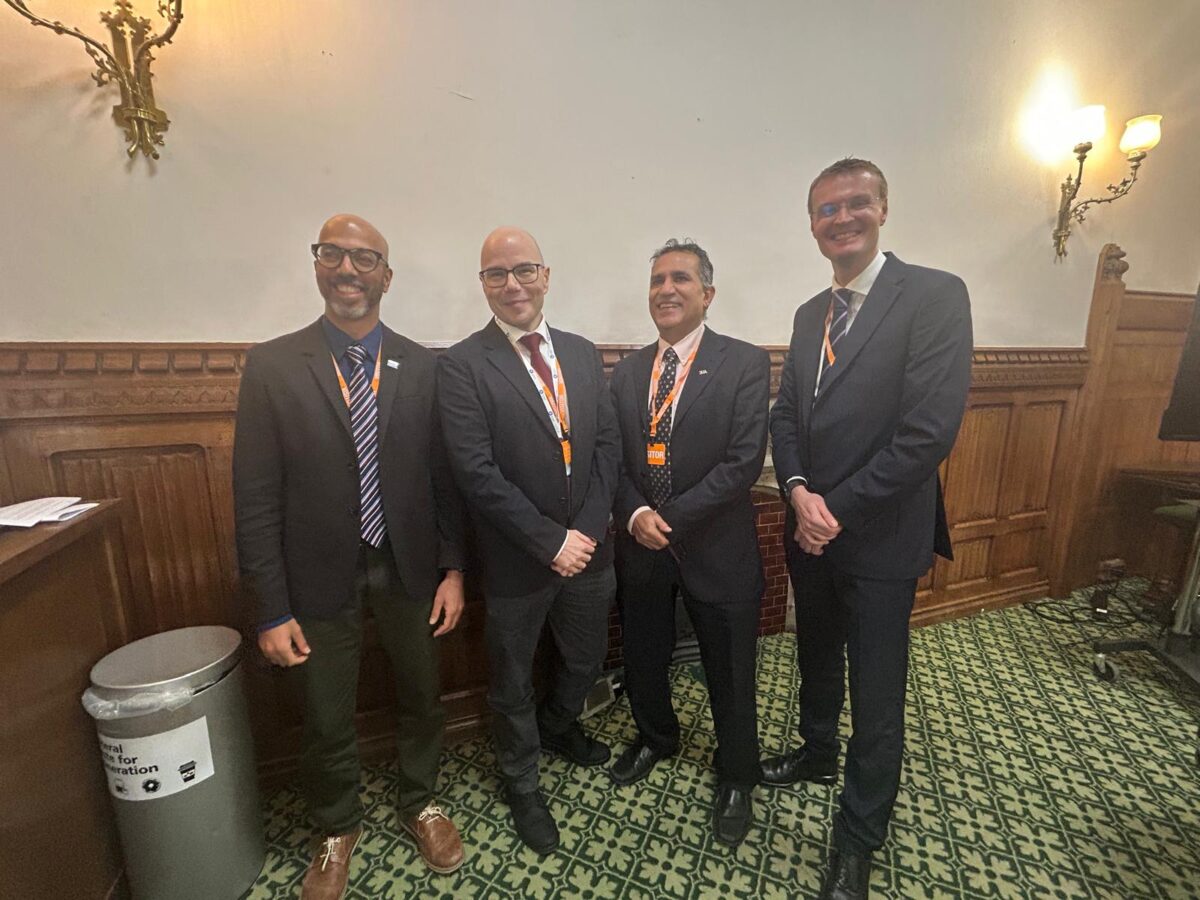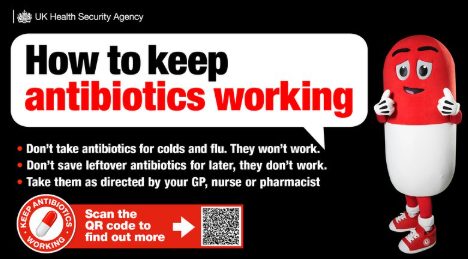Pharmacy Contraception Service (PCS)
Published on: 22nd September 2022 | Updated on: 18th December 2025
This page contains information about the Pharmacy Contraception Service (PCS), which is commissioned by NHS England as an Advanced service.
The PCS commenced on 24th April 2023, allowing the on-going supply of oral contraception (OC) from community pharmacies. On 1st December 2023, the service expanded to include both initiation and on-going supply of OC. From 29th October 2025, the service was further revised to include the addition of oral emergency contraception (EC), provision by pharmacy technicians and the addition of drospirenone to the progestogen only pill list.
Latest updates
PCS expansion goes live (29th October 2025)
NHS England has confirmed in an email (27th October 2025) to all pharmacies in England that the expansion of the PCS will go live on Wednesday, 29th October, as had originally been planned.
Read our news story confirming the announcement
Click on a heading below for more information
The NHS Long Term Plan (LTP) Chapter 2 highlighted the importance of NHS services complementing the action taken by local government to support the commissioning of sexual health services. A Public Health England resource for commissioners (2019) also highlighted the role community pharmacy can play in supporting ongoing contraception.
In line with the agreement of the CPCF in 2019 to “test a range of prevention services’, a tiered pharmacy contraception service was designed. The initial tiered approach proposed was as follows:
- Tier 1 – Ongoing monitoring and supply of repeat oral contraception (OC);
- Tier 2 – Initiation of OC via a Patient Group Direction (PGD);
- Tier 3 – Ongoing monitoring and management of repeat long-acting reversible contraception (LARC), excluding intrauterine systems (IUS) and intrauterine devices (IUD); and
- Tier 4 – Initiation of LARCs.
In 2021, NHS England commenced a pilot involving pharmacies offering repeat supplies of oral contraception to people who had previously had the product prescribed.
In the Year 4 and Year 5 CPCF negotiations, the Department of Health and Social Care (DHSC) and NHS England proposed the commissioning of a Pharmacy Contraception Service, as an Advanced service, building on the learning from the pilot service.
In April 2023, the Tier 1 service launched. This initially involved community pharmacists providing ongoing management of routine oral contraception that was initiated in general practice or a sexual health clinic.
The supplies are authorised via a PGD, with appropriate checks, such as the measurement of the person’s blood pressure and body mass index (BMI), being undertaken, where necessary.
In May 2023, NHS England announced The Delivery Plan for recovering access in primary care. This highlighted the ambition to expand the PCS to increase access to and convenience of contraception services in line with the Government’s Women’s Health Strategy for England which had been announced in August 2022. The strategy flagged community pharmacy had a part to play in increasing choice in the ways people can access contraception.
Following negotiations between Community Pharmacy England, the Department of Health and Social Care and NHS England, an expansion of the OC service was agreed and announced in November 2023. The expanded service, which removes reference to the original tiered service proposal, enables community pharmacists to also initiate oral contraception, via a PGD, and provide ongoing clinical checks and annual reviews.
Following negotiations between Community Pharmacy England, DHSC and NHS England on the funding arrangements for the CPCF for 2024 to 2025 and 2025 to 2026, a further expansion of the PCS was agreed and announced on 31st March 2025. The further expansion of the service will allow pharmacists and pharmacy technicians to provide initiation of OC, routine monitoring and ongoing supply of OC and provision of oral EC via PGDs.
An on-demand webinar that explains some of these changes is also available:
The service provides another opportunity for pharmacy owners to help address health inequalities by providing wider healthcare access in their communities and signposting service users into local sexual health services in line with NICE guideline NG 102.
The objectives of the service are to:
- Provide a model for community pharmacy teams to initiate provision of OC, and to continue the provision of OC supplies initiated in primary care (including general practice and pharmacies) or sexual health clinics and equivalent;
- Provide a national model for community pharmacy teams to provide free oral EC to individuals of childbearing potential to reduce the risk of pregnancy after unprotected sexual intercourse (UPSI) or where regular contraception has been compromised or used incorrectly;
- Establish an integrated pathway between existing services and community pharmacies that provides people with greater choice and access when considering whether to be initiated on an OC, or seeking to continue their current form of OC; and
- Support tackling health inequalities through providing wider access to contraception services. Providing individuals from high-risk communities and vulnerable groups an integrated sexual health service from a pharmacy of their choice with no requirement to be registered with a general practice.
The service aims to provide:
- People greater choice from where people can access contraception services;
- Consistent access from community pharmacies across England to free OC and oral EC for individuals of childbearing potential, removing variation in the service offer found within locally commissioned services; and
- Extra capacity in primary care and sexual health clinics (or equivalent) to support meeting the demand for more complex assessments.
The service requirements are included in the service specification and Patient Group Directions (PGDs), which pharmacy owners must read before deciding whether to provide the service.
The service incorporates initiation and repeat supplies of contraception; any pharmacy registering to provide the service must provide both initiation and repeat supplies.
Download the service specification and Patient Group Directions (20th October 20225)
Service Directions & Drug tariff determination
Download the service pathway for initiation
Download the service pathway for ongoing supply
Download the service pathway for oral Emergency Contraception
Community Pharmacy England Briefing 017/25: Guidance on the NHS Pharmacy Contraception Service
This Community Pharmacy England Briefing provides guidance for community pharmacy owners and their teams on the updated Pharmacy Contraception Advanced Service and it replaces the previous briefing on the service (Briefing 031/23).
Community Pharmacy England Briefing 016/25: Pharmacy Contraception Advanced Service – What’s changing?
This Community Pharmacy England Briefing provides guidance for community pharmacy owners and their teams who are already providing the PCS on the changes to the service.
The service involves community pharmacists and pharmacy technicians providing:
- Initiation: where a person wishes to start OC for the first time or needs to restart OC following a pill free break. A person who is being switched to an alternative pill following consultation can also be considered as an initiation;
- Ongoing supply: where a person has been supplied with OC by a primary care provider or a sexual health clinic (or equivalent) and a subsequent equivalent supply is needed. Their current supply of OC should still be in use; and
- Advice on EC and supply of oral EC: where a person of childbearing potential requires oral EC to reduce the risk of pregnancy after UPSI or where regular contraception has been compromised or used incorrectly.
Pharmacy owner checklist
Once a pharmacy owner has decided they wish to provide the service, Community Pharmacy England’s implementation checklist will guide them through the steps they need to take to prepare to provide the service.
Download the Pharmacy Contraception Service pharmacy owner implementation checklist (September 2025)
Pharmacist and pharmacy technician checklist
Download the pharmacist and pharmacy technician implementation checklist: Pharmacy Contraception Service (October 2025)
This checklist provides suggested actions that pharmacists and pharmacy technician can undertake to prepare to provide the service.
Consultation room
Pharmacies (with the exception of Distance selling premises pharmacies (DSPs)) must have a consultation room in order to be able to offer this service, which meets the requirements in the Terms of Service.
The consultation room must also have IT equipment accessible within the room to allow contemporaneous records of the consultations provided as part of this service.
If a pharmacy owner has had agreement from NHS England that their pharmacy is too small for a consultation room, then they are not able to provide the service solely on a remote basis.
If the pharmacist or pharmacy technician and individual agree that the service can be carried out remotely, this should be carried out via telephone, or another live audio link or a live video link in circumstances where the conversation cannot be overheard, except by someone whom the individual wants to hear the conversation. That may, for example, mean the pharmacist or pharmacy technician uses the consultation room to undertake the remote consultation. NHS Guidance to support community pharmacy teams can help to plan for this. Further information on remote consultations can be found on our website.
Equipment to be used in the service
In some cases, a blood pressure reading and a BMI, will need to be recorded, according to the PGD protocol. Pharmacy owners (with the exception of DSPs) will, therefore, need to ensure that they have the necessary equipment required to undertake blood pressure readings, measure an individual’s weight and height.
Pharmacy owners must ensure all equipment used to carry out these measurements for individuals within the pharmacy are accurate and fit for purpose in line with the GPhC standards.
Equipment that is to be used to undertake clinic blood pressure checks in the service must be validated by the British and Irish Hypertension Society (BIHS), so pharmacy owners must use a ‘normal’ BP meter which is included on one of the validated BIHS lists:
Validated BP Monitors: Clinical, Policy, and Procurement Guidance
Note: The BIHS are currently reviewing how they present information on their approved devices on their website. Pharmacy owners who need to review a copy of the validated equipment list can can access a spreadsheet of validated devices via the above link.
For further considerations regarding selection of blood pressure monitoring devices, please consult the ‘BP meters to be used in the service’ section of our Hypertension Case-Finding Service hub page.
Equipment maintenance, calibration & cleaning
To meet the service specification requirements, validation, maintenance and recalibration of clinic blood pressure monitors should be carried out periodically according to manufacturers’ instructions.
Infection control measures and cleaning must be carried out in line with the instructions of the manufacturer or supplier and in line with current infection control guidance. Detergent and disinfectant wipes can damage plastic surfaces of medical devices if they are not compatible with the surface material. In line with MHRA’s guidance, pharmacy owners are advised to only use cleaning products that are compatible with the device.
The standard operating procedure (SOP) for the service must include the processes for cleaning, maintenance, validation and recalibration of the equipment used. Pharmacy owners can access additional guidance from the MHRA’s Managing Medical Devices guide.
IT requirements
Pharmacy owners must use an NHS-assured clinical IT system to make their clinical records and payment claims for the service and, where the person has consented, to send messages containing the individual’s consultation outcomes to their general practice.
Details of the IT solutions available to support the service can be found on our Pharmacy services IT requirements webpage.
Pharmacy owners providing the service, will need to consider which system they want to use and will then need to enter into a contract with that supplier.
Standard Operating Procedure
Pharmacy owners must have an SOP for the service, which all staff participating in provision of the service must be familiar with and follow. The SOP must include the process for escalation of clinical and non-clinical issues identified, including accessing Level 3 safeguarding advice, signposting details, record keeping, equipment cleaning, maintenance, validation and recalibration of the equipment used and staff training.
Where a pharmacy technician is to deliver the service using a PGD, the pharmacy owner’s SOP for dispensing/supplying medicines must also include the process of how the responsible pharmacist will supervise associated activities connected to the supply of medicines, such as labelling. The SOP should define the roles and responsibilities of the responsible pharmacist and pharmacy technician to meet legal requirements and to enable a supply of medicine to be made autonomously by the pharmacy technician under the PGD, with appropriate supervision.
Various pharmacy support organisations provide template SOPs which their members can personalise for use in their pharmacy.
Signposting and local safeguarding
We have produced a local referral and contact details template for the service which can be used to record details of local GP practices and sexual health clinics signposting into the service, as well as details on other local pharmacies providing the service and the local safeguarding lead’s contact details.
Local referral and contact details for the service (Word)
Local referral and contact details for the service
The NHS England safeguarding app has a directory of safeguarding contacts for every local authority in England, searchable by region. It can be accessed via Apple iOS or Google Play – download it by visiting your device’s app store and searching for ‘NHS Safeguarding’.
Pharmacy owners must also ensure the service is included in their business continuity plan.
Competency and training requirements
Pharmacy owners must ensure that pharmacy staff providing any aspect of the service are competent to do so in line with the specific skills and knowledge in the service specification and the relevant PGDs. This may involve completion of training.
Pharmacy owners need to keep documentary evidence that all pharmacy staff involved in any aspect of provision of the service are competent with regards to the specific skills and knowledge outlined in the service specification and the relevant PGDs.
Pharmacists and pharmacy technicians providing the service will be personally responsible for remaining up to date with the skills and competencies identified in the service specification and associated PGDs.
To provide the service, the pharmacist and pharmacy technicians should have evidence of competence in the clinical skills and knowledge covered in the below listed training modules on the Centre for Pharmacy Postgraduate Education (CPPE) and/or the NHS England e-learning for healthcare (elfh).
CPPE also has a list of the modules and other useful tools and resources on the NHS PCS page of their website.
Packages that are highly recommended are indicated by an asterisk *
The Faculty of Sexual and Reproductive Healthcare (FSRH) has now changed its name to the College of Sexual and Reproductive Healthcare (CoSRH). Some training packages, pages and documents will continue to display the FSRH name. Where you see FSRH, this refers to CoSRH.
Mandatory training
Pharmacists and pharmacy technicians providing the service must have completed one of the recommended Safeguarding level 3 training materials OR have direct access to professional advice from someone who can advise on Safeguarding at Level 3.
- Safeguarding Level 3 - Safeguarding Children and Adults Level 3 for Community Pharmacists – video on elfh;
OR
- Safeguarding Level 3 elfh Safeguarding Children and Young People (SGC) – Safeguarding Children Level 3.
Recommended training modules
Emergency Contraception
- * CPPE Emergency contraception e-learning including emergency contraception e-assessment;
Ongoing Supply
- * CPPE Contraception e-learning including contraception e-assessment;
OR the following four subsections of:
- *Module 3 – Contraceptive Choices of the CoSRH Sexual and Reproductive Health e-learning (e-SRH) on elfh:
-
- 03_01: Mechanism of action, effectiveness and UKMEC;
- 03_02: Choosing contraceptive methods;
- 03_03: Combined hormonal contraception; and
- 03_04: Progestogen only methods (oral and injectable).
- * CPPE Sexual health in pharmacies e- learning and e-assessment;
OR the following four subsections of
- *Module 9 – STIs of the CoSRH e-SRH on elfh:
-
- 09_01: Epidemiology and transmission of STIs;
- 09_02: Sexually transmitted infection (STI) testing;
- 09_03: STI management; and
- 09_04: Partner notification.
AND one subsection in the
- *External Resources module of the Sexual Health (PWP) e-learning on elfh:
-
- CoSRH – Contraception counselling eLearning.
Initiation of contraception
- The following subsections of Module 2 – Consent and history taking of CoSRH e-SRH on elfh:
-
- 02_01 Health history and risk assessment; and
- 02_02 Confidentiality, chaperones, and consent.
- The following subsection of Module 3 – Contraceptive choices of the CoSRH e-SRH on elfh:
-
- * 03_07 Barrier contraceptives
- The following subsections of Module 5 – Contraception: managing side-effects and complications of the CoSRH e-SRH on elfh:
-
- 05_01 Managing bleeding problems in women using contraceptives;
- 05_02 Managing contraceptive side-effects; and
- 05_03 Managing side-effects and complications of IUD and IUS.
Other training to support clinical practice
- CPPE Documenting in patient clinical records e-learning;
- CPPE Remote consultation skills e-learning;
- Patient group directions e-learning on elfh;
- CPPE Pharmacy technicians: using patient group directions in practice; and
- CPPE consultation skills for pharmacy practice: taking a person-centred approach and e-assessment.
Pharmacists and pharmacy technicians must also be familiar with at least one online shared decision-making contraception consultation tool. These tools can be used to support the pharmacist or pharmacy technician and are best shared with individuals ahead of a consultation to support their decision making. Examples are:
- Brook; and
- Contraception Choices.
Additional optional training
Pharmacists and pharmacy technicians wanting to undertake further training to enhance their knowledge and skills to provide the PCS can also consider additional training on an optional basis to support their own continuing professional development (CPD).
Support with additional CPD can be found on the:
- CoSRH Contraception Provision Course for Pharmacy Professionals FSRH
- CPPE Contraception hub page and CPPE Emergency hormonal contraception hub page; and
- Pharmacy courses page of the Health Academy website.
Pharmacy team training
The whole pharmacy team can proactively promote this service. Teams should be briefed on the service and coached on how to best approach people about the service. A pharmacy team briefing on the service and a briefing providing top tips when providing the service is available to assist pharmacy owners to engage and coach their team members.
Pharmacy staff who are going to provide blood pressure measurements and BMI calculations must have the necessary training required to undertake blood pressure readings and measure an individual’s weight and height. These staff must:
- Be familiar with the appropriate sections of NICE guideline Hypertension in adults: diagnosis and management [NG136];
- Have read and understood the operational processes to provide blood pressure and BMI measurements; and
- Have completed the recommended training on how to use the blood pressure monitoring equipment which should be provided by the equipment manufacturer/supplier.
Sign up to provide service
Pharmacy owners who are not registered to provide the service must notify NHS England that they intend to provide the service by completion of an electronic registration through the NHSBSA’s MYS portal.
NHS Profile Manager
Once registered to provide the service, you must update your pharmacy’s service details on the NHS website using NHS Profile Manager. This will allow your pharmacy to be identified by the public and by other healthcare professionals as providers of the service.
Details on how to do this are available on our NHS Profile Manager webpage.
Engagement with local GP practices, local sexual health clinics and/or PCN colleagues
There is no specific requirement within the service specification for pharmacy owners to engage with local general practices, local sexual health clinics and/or Primary Care Network (PCN) colleagues prior to provision of the service. However, as the service can receive signposted referrals from local general practices and sexual health clinics (or equivalent), to maximise service opportunities, it is good practice to make them aware the pharmacy is participating in this service.
As oral EC provision is now part of the service, pharmacy owners must endeavour to provide this element of the service throughout the hours the pharmacy is open. For provision of OC elements of the service, the pharmacy owner can still identify the hours and/or days they will provide these elements of the service and confirm the availability of the various aspects of the service as part of local conversations with stakeholders if they intend to receive signposted referrals.
Where practices and sexual health clinics (or equivalent) wish to use this facility, pharmacy owners should agree any local process by which referrals can be received. On receipt of a referral, a member of the pharmacy team should agree with a referred person, the date and time of their consultation. Pharmacy staff must respond to anybody requesting a supply of oral EC or OC as soon as is reasonably possible, having particular regard to the need for timely provision of EC after UPSI, or where regular contraception has been compromised or used incorrectly. Following discussion, if the pharmacy is unable to offer a consultation within the time needed to meet the person’s EC or contraception need, they should be signposted to an alternative pharmacy or other service provider for a consultation.
To support pharmacy owners, their teams and LPCs to engage with local general practice colleagues, we have a range of resources available:
Download the checklist – Promoting the service to your GP practice and sexual health clinic
This checklist provides suggested actions that pharmacy owners and their teams can choose to undertake to help promote the Pharmacy Contraception Service to their local GP practice team and their local sexual health clinic team.
Newly providing the service:
Download the general practice and sexual health clinic letter / email service notification template (Microsoft Word)
A letter / email template to support pharmacy owners to notify GP practices and local sexual health clinics (or equivalent) that the pharmacy will be providing the service is available.
Already providing the service:
Download the general practice and sexual health clinic letter / email service expansion notification template (Microsoft Word)
A letter / email template to support pharmacy owners to notify GP practices and local sexual health clinics (or equivalent) that the service has expanded to include emergency contraception.
A briefing to provide information for general practice teams and local sexual health clinics (or equivalent) on the service is available to assist pharmacy owners to engage their local colleagues.
Download the Briefing for general practice and sexual health clinics (or equivalent) teams
Download the Pharmacy Contraception Service: What GPs need to know infographic
Presentations
Download the PowerPoint presentation aimed at GP practice and sexual health clinic teams (November 2025)
A template presentation on the service that can be used by pharmacy owners or members of their team to present to GP practice or sexual health clinic teams, for example, at a practice meeting.
Download the PowerPoint presentation aimed at patients (November 2025)
A template presentation on the service that can be used to present at events such as Patient Participation Group meetings at GP practices.
Download the Pharmacy Contraception Service template PowerPoint presentation aimed at Local Medical Committees and general practice colleagues – for use by LPCs (November 2025)
A template presentation on the service that can be used by LPCs to present to Local Medical Committees and general practice colleagues.
Practice posters
Community pharmacy England
Download service posters for non-pharmacy sites
NHS England
Download the service digital general practice poster
A digital poster to assist general practices to highlight the availability of the service from participating community pharmacies is available.
Pharmacy owners who will be providing the service can use resources such as a posters, social media tools, flyers, a service leaflet and, where facilities exist, digital marketing resources to advertise the availability of the service in the pharmacy.
Community Pharmacy England resources
We have developed a range of materials which pharmacy owners can use to promote the availability of this service to the public.
Our shared folder (link below) allows you to download the latest versions of the following resources:
- Posters for display (both ready to use and editable versions);
- Suggested social media graphics and messages; and
- Template local press releases (to be added).
Download here: Pharmacy Contraception Service promotional materials
Download small flyers 1 PCS (September 2025) (Microsoft Word)
Download small flyers 2 PCS (September 2025) (Microsoft Word)
Download a template leaflet to promote the service (Microsoft Word)
When a person attends the pharmacy to collect an NHS repeat prescription for OC, oral EC or makes contact for other services, e.g. to access a supply of emergency oral contraception, the service can be highlighted to them to consider their ongoing contraception requirements.
Websites and newsletters
Download a template news story for websites or newsletters aimed at the public (Microsoft Word)
Download a template news story for websites or newsletters aimed at the public (short version) (Microsoft Word)
These templates contain content to promote the service to the public via the pharmacy’s own website, on GP practice websites or in their patient newsletter.
The pharmacy team
A pharmacy team introductory briefing sheet and a guide on how to successfully recruit people, using some of the insights from the PCS pilot sites is available as part of the briefing for pharmacy teams on the service.
Download Briefing 019/25 – Briefing for pharmacy teams on the service
We have incorporated all of the above resources into a PCS promotion checklist so pharmacy owners can work through the checklist to see if there are any additional activities that they or their teams could participate in to promote the service to the public:
Download the Pharmacy Contraception Service checklist: Promoting the service to patients
NHS England resources
Posters
Download the service poster – A3 size
Download the service poster (Bengali)
Download the service poster (Polish)
Download the service poster (Punjabi)
Download the service poster (Urdu)
Download the service digital general practice poster
Posters are also available to promote the service on the DHSC Campaign Resource Centre. Further NHS England resources to support the introduction of oral EC to the service will be available shortly.
Digital posters
Download the service digital poster
Download the NHS England Pharmacy Contraception Service A3 digital poster for university sites
Download the service digital poster (Bengali)
Download the service digital poster (Polish)
Download the service digital poster (Punjabi)
Download the service digital poster (Urdu)
Social media tools
Other resources
NHS England Pharmacy Contraception Service business card leaflet (Format 1)
NHS England Pharmacy Contraception Service business card leaflet (Format 2)
NHS England Pharmacy Contraception Service business card leaflet (Format 3)
Signposting patients
A service finder, on the NHS website, lets members of the public and healthcare professionals search for a pharmacy that offers the service.
Individuals can access the service by any of the following routes:
- Identified as clinically suitable by the pharmacist or pharmacy technician and accepts the offer of the service;
- Self-refer to a community pharmacy;
- Signposted by their general practice;
- Signposted from a sexual health clinic (or equivalent); or
- Signposted from other NHS service providers, e.g. urgent treatment centres or NHS 111.
The pharmacy must respond to anybody requesting the service as soon as is reasonably possible. Following discussion, if the pharmacy is unable to offer a consultation within the time needed to meet the person’s EC or contraception need, they should be signposted to an alternative pharmacy or other service for a consultation.
Eligibility
The service specification lists the following inclusion and exclusion criteria for the service:
Inclusion criteria
To be eligible to access this service a person must be:
- An individual of childbearing potential seeking a supply of oral EC only following confirmation of UPSI or where regular contraception has been compromised or used incorrectly OR
- An individual seeking to be initiated on an OC, or seeking to obtain a further supply of their ongoing OC:
- Combined oral contraceptive (COC) – age from menarche up to and including 49 years of age; or
- Progestogen only pill (POP) –
- Norethisterone, Levonorgestrel and Desogestrel – from menarche up to and including 54 years; and
- Drospirenone only – from menarche up to and including 49 years.
Exclusion criteria
A person will not be eligible for this service if:
- The individual is considered clinically unsuitable, or is excluded for supply of oral EC or OC according to the PGD protocols, including, but not limited to:
- Individuals under 16 years of age and assessed as not competent using Fraser Guidelines; and
- Individuals 16 years of age and over and assessed as lacking capacity to consent.
- All advance supplies of oral EC.
Additional inclusion and exclusion criteria are listed in the PGDs and as such, pharmacy owners should refer to both the service specification and the PGDs to confirm the full inclusion and exclusion criteria for the service. Where people are not eligible for the service, pharmacy team members can signpost them to other appropriate local services.
Consent
Prior to provision of the service, verbal consent must be sought from the individual by the pharmacist and recorded in the clinical record for the service.
Pharmacy owners also need to ensure that the individual is made aware that the following sharing of information will take place:
- The sharing of information between the pharmacy and the individual’s general practice (where the individual agrees to this) to allow the recording of the appropriate information in their GP practice record;
- The sharing of information about the service with NHS England as part of service monitoring and evaluation; and
- The sharing of information about the service with the NHSBSA and NHS England for the purpose of contract management and as part of post-payment verification (PPV).
However, if the person does not consent to sharing information with their general practice or they are not registered with a general practice, the consultation can still proceed, and a notification to the practice will not need to be sent.
The General Pharmaceutical Council’s Guidance on Consent provides information on consent for pharmacists and their teams.
Safeguarding
Either party may request / offer a chaperone to be present during the consultation. More information regarding use of a chaperone can be found in the Clinical Governance section of our website. Where a chaperone is present during the consultation, details of the chaperone should be documented in the clinical record.
During the consultation, if the pharmacist is concerned about a potential safeguarding issue, then appropriate action should be taken, where necessary, in line with local safeguarding processes. Ant actions taken should be documented in the clinical service notes.
If the individual is less than 16 years of age, an assessment based on Fraser guidelines must be made and documented.
If the individual is less than 13 years of age, the pharmacist should speak to the local safeguarding lead and follow the local safeguarding policy.
NHS support for victims and survivors of sexual assault and abuse
Should an individual need assistance, NHS sexual assault referral centres (SARCs) provide a safe space and dedicated care for anyone who has been raped, sexually assaulted or abused.
SARCs are available across England, to all regardless of sex, gender identity, age, the type of incident and when it happened. Individuals can get help from a SARC without having to talk to the police or report what happened to them.
SARCs offer specialist practical, medical and emotional support 24/7, which includes crisis care, medical and forensic examinations, emergency contraception and testing for sexually transmitted infections. They can also arrange access to an independent sexual violence advisor, as well as referrals to mental health support and voluntary sector sexual violence support services.
Access to a SARC is by appointment; individuals can contact a SARC to make an appointment or ask a health care professional, family member, friend or other representative to do this for them. Individuals also have the option of accessing a SARC by police referral or escort.
Getting help from a SARC
Click here to find your nearest SARC.
Further information is available at www.nhs.uk/sarcs.
Identifying and Responding to Sexual Assault and Abuse programme
Pharmacists and pharmacy staff who want to undertake additional training to support with information giving and advice for identifying and responding to sexual assault and abuse can access a free e-learning programme available through the e-learning for Healthcare portal. The resources are aimed at health and care professionals who may be involved in the care of people who have experienced rape, sexual assault or abuse.
Blood pressure and BMI checks
As combined oral contraceptive supplies will require the person’s blood pressure and BMI, and in some cases, certain requests for oral EC supplies may require consideration of weight or BMI, before a supply can be made, a blood pressure reading and a BMI, will need to be recorded, according to the PGD protocol.
Where a DSP pharmacy is providing a remote consultation and requires an individual’s blood pressure, height and weight, these measurements cannot be performed in the DSP pharmacy.
Blood pressure, a BMI reading, or an individual’s height and weight can be provided by the person accessing the service and may be accepted where the pharmacist or pharmacy technician feels this is clinically appropriate. Any self-reported measurements will need to be recorded as such.
Where BMI and blood pressure measurements are performed within the pharmacy (not in DSPs), these can be conducted by the pharmacist or pharmacy technician as part of the consultation or by suitably trained and competent pharmacy staff in advance of the consultation.
The provision of a blood pressure check (clinic check) should be carried out in line with NICE guidelines.
A visual guide that can be used to support suitably trained and competent pharmacy staff providing this is included as a standalone reference source.
Download the clinic blood pressure guide
To support the calculation of body mass index, the NHS website provides an online BMI calculator which can be accessed via the following link: BMI calculator (www.nhs.uk)
Pre-consultation
A template pre-consultation questionnaire has been developed to allow people who will attend the pharmacy, or who are in the pharmacy for the service, to provide information which can then be used by the pharmacist or pharmacy technician during the consultation. The pre-consultation questionnaire may assist pharmacy owners in reducing the pharmacist/ pharmacy technician/service user contact time, if their chosen IT system does not offer any pre-consultation solutions.
Download the contraception pre-consultation questionnaire template (Microsoft Word)
Download the contraception pre-consultation questionnaire template
Download the EC pre-consultation questionnaire (October 2025) (Microsoft Word)
Download the EC pre-consultation questionnaire (October 2025)
The Consultation
All consultations should be verbal (face-to-face or remote) and must be provided from the pharmacy premises. All consultations must be directly with the person accessing the service, and for
whom the medication is for.
The clinical appropriateness of a supply of OC will be determined by the pharmacist, as part of a consultation with the individual, following the guidelines in the PGD. The following should take place during the consultation and reference to the PGD should be made:
- An explanation of consent and recording of the response to whether the person consents to the consultation;
- For oral EC consultations, the discussion with the person must include information on more effective forms of EC, e.g. the fitting of a copper intrauterine device (Cu-IUD);
- For OC consultations, the discussion must include information on alternative and more effective forms of contraception, e.g. Long-acting reversible contraception (LARC);
- Blood pressure measurement and BMI calculation and/or recording with an explanation of the results where these measurements are appropriate and are undertaken as a part of the consultation (where this is not done by suitably trained and competent pharmacy staff before the consultation);
- With the individual’s consent, their general practice record (e.g. via GP Connect Access Record), national care record, or an alternative clinical record for the individual, should be checked by the pharmacist or pharmacy technician unless there are exceptional circumstances preventing this; and
- NHS-assured clinical record systems should offer consultation prompts and will facilitate the recording of information that is required to be collected as part of the service.
Additional advice & signposting
To assist individuals in obtaining further information, the pharmacist or pharmacy technician can signpost individuals to other information sources, such as NHS.UK, to obtain additional information and advice to improve their understanding about contraception and sexual health.
Where appropriate, consultations should provide additional support and advice, including advice on the avoidance of pregnancy and sexually transmitted infections (STIs) through safer sex and condom use. This may include highlighting other locally commissioned pharmacy services (such as condom supply services or chlamydia testing) that the pharmacy is able to offer or signposting to other services that provide LARC and diagnosis and management of STIs.
Below are links to some examples of information and resources which may be appropriate to signpost individuals to as part of this service. Pharmacists and pharmacy technicians are advised to make themselves familiar with the content on these sites which can also be used as shared decision-making contraception consultation tools:
| Organisation | Resources |
| NHS UK |
This aims to give practical information to everyone who wants to know more about contraception, or who may have a question about the method they use or are thinking about using. |
|
Contraception Choices website – University College London A range of posters and online content developed by a team of doctors, nurses and researchers from University College London in collaboration with women aged 15 to 30. |
This aims to help women and couples decide which method of contraception might suit them best. The site provides honest information on the advantages and disadvantages of each method, and tackles concerns directly. |
|
Brook is a charity supporting people with their sexual health and wellbeing. They offer a range of services to support their mission of helping people to live healthier lives. |
Advice on:
|
Outcomes
Criteria met
If the assessment criteria are met, supply of an oral EC or OC can be made, as appropriate.
Supply of oral EC
A single dose of oral EC should be made for all oral EC consultations. This should be one tablet unless the person meets criteria outlined in the PGD that allow for an alternative regimen.
If a person vomits within three hours of the initial dose of oral EC being taken, a further supply of oral EC can be made by the pharmacist or pharmacy technician. This should be recorded as a separate consultation (and will be paid for accordingly), however, the reason for the second supply should be noted in the clinical record.
Supply of OC
The CoSRH UK Medical Eligibility Criteria for Contraceptive Use (UKMEC) calculator may support pharmacists and pharmacy technicians in making a clinical decision on the most appropriate choice of contraceptive. The UKMEC helps clinicians decide what contraceptives they can safely recommend based on the medical conditions of patients in their care. Additional guidance on the UKMEC is available here
Initiation
On initiation, the quantity of OC supplied should not exceed 3 months.
Where a person is initiated on an OC, pharmacists and pharmacy technicians should use their professional discretion as to the appropriate choice of product, from those included in the PGD. Local formularies/restrictions should be referred to and followed accordingly. Pharmacists and pharmacy technicians should refer to their local integrated care board (ICB) formulary for further information.
Ongoing supply
Following initiation, ongoing supplies of an OC should be for a minimum of six month’s supply, unless there are clinical reasons not to. Any such reasons should be documented in the clinical record.
Supplies of up to 12 months duration can be made, and unless there are reasons not to, such a duration of supply should be considered in line with the CoSRH guidance. Restricting the length of supply could result in unwanted discontinuation of the method and an increased risk of pregnancy for the person.
Ongoing supplies should be made in line with the person’s previous supply, e.g. in the instance that a branded product has been supplied for clinical reasons such as an allergy to product constituents, the repeat supply should be made from an equivalent brand/generic equivalent of OC, that follows any medicines formulary requirements of the local ICB.
General advice
Supplies should be in appropriately labelled original packs.
Clinical record systems should prompt the recording of all the required information listed in the PGD.
Where necessary, supplementary written information, links to online resources, or signposting to other support services should be given. Records should also be made of any advice and signposting provided.
For both NHS supplies of oral EC and OC following a consultation, it is expected that the supply will be made with reasonable promptness. The time period to supply must take into account the clinical need of the individual, for example, a supply of oral EC should be made as soon as possible to allow the individual to take the medication within the defined timeframes of clinical efficacy of the oral EC. DSP pharmacies providing the service should make necessary arrangements for a prompt delivery of the item, at no cost to the individual.
Criteria not met
If a supply of OC is not deemed clinically appropriate, the pharmacist or pharmacy technician should explain why this is the case to the person and refer them to their general practice or sexual health clinic (or equivalent).
Clinical record systems should prompt the recording of:
- A record of the reason for not supplying against a PGD; and
- A record of the referral to an alternate service provider.
Information for service users (including healthy lifestyles)
Service user’s measurements
Where a blood pressure reading and/or a BMI are needed, according to the PGD protocol, and these are undertaken in the pharmacy, the outcomes of these should be discussed with the person. The person’s results should be provided in a format that best suits them. The person may prefer to have their readings written on a printed leaflet, it may be completed electronically by the pharmacist or pharmacy technician and emailed to the person or the person may prefer to take a photo of their readings using their phone.
Download a leaflet to support provision of readings (Microsoft Word)
Download a leaflet to support provision of readings
Information resources for individuals to use before/during/after consultations
Download Pharmacy Contraception Service – online information sources for patients
When pharmacists or pharmacy technicians are providing this service, there are websites for individuals to be signposted to.
This resource lists all the website links.
Each patient being supplied an OC should be given a copy of the manufacturer’s patient information leaflet about the OC or be directed to a web-based version of the leaflet.
Hyperlinks to the websites are listed, alongside QR codes for each website so patients can scan this to access the website link on their mobile phones.
Healthy lifestyle advice
In line with the principle of Making Every Contact Count, the pharmacist or pharmacy technician should encourage the individual to discuss their lifestyle/behaviours and appropriate lifestyle advice should be provided where applicable. Local initiative and services that may assist the person should be signposted to.
Examples of resources which may be appropriate to support the individual or raise awareness are detailed in the Patient advice – Providing the service section of the Hypertension Case-Finding Service hub page.
Pharmacy owners should record any advice provided and any signposting in the clinical record. Where a person is not registered with a GP practice, information should be provided to assist the person to do this.
Communicating with GP practices following a consultation
If the person provides consent to share the outcome of the consultation with their general practice, a secure electronic notification should be sent on the day of the consultation or on the following working day. This will be sent as a structured message in real-time by the approved clinical services IT system. If the structured message system is not available or fails, the pharmacy owner must ensure a copy of the consultation is sent or emailed (via NHSmail) to the individual’s registered general practice.
If the person does not consent to sharing information with their general practice or they are not registered with a general practice, the consultation can still proceed, and a notification to the practice will not need to be sent.
Where an action is required by the general practice team (such as booking the patient in for a follow up or appointment) an action message or alternative form of an Urgent Action communication (rather than the standard post event message) must be sent to the practice.
All four community pharmacy IT systems providing support for the service will, where the patient has provided consent, automatically send standard post event messages containing details of the consultation to the GP clinical IT system via a structured message, ready for a staff member at the practice to check and update the patient’s record.
This functionality – GP Connect: Update Record – means post-event messages sent by pharmacy IT systems will appear in the general practice IT system’s workflow. The structured message will be provisionally held against the patient record and will be visible by people reviewing the record. A member of the practice team will need to review and accept the message. The structured message will then be ingested into the patient record without the need for transcribing or coding.
Messages will be available to anyone accessing the general practice record including patients themselves (e.g. by logging into their account on the NHS website or NHS App).
The structured message which is incorporated into the patient record will include structured data on the consultation and free text notes added by the pharmacist.
Pharmacists and pharmacy technicians wanting to update their knowledge of best practice record keeping can access the CPPE Documenting in patient clinical records e-learning programme.
System supplier specific information for general practices is available via the following links:
Read more about GP Connect: Update Record
Record keeping and data management
Pharmacy owners should maintain appropriate clinical records to ensure effective ongoing service provision and audit. Actions for pharmacy owners to take regarding record keeping in response to exceptional circumstances are outlined in the service specification.
Clinical records of service provisions should be retained for an appropriate period. Records of the reimbursement data reported to the NHSBSA’s MYS portal should be retained for three years for PPV purposes.
As pharmacy owners are the data controller, it is for each pharmacy owner to determine what the appropriate length of time is, beyond three years that the clinical records are kept for. This retention period should be in line with both the requirements for the record type and if the record relates to a child. Decisions on this matter should be documented in the SOP and should be in line with Records Management Code of Practice for Health and Social Care.
The data which is submitted to the MYS portal via the application programming interface (API) will be used by the NHSBSA for payment and PPV purposes. Some of this data, which has been anonymised, will be shared with NHS England for service evaluation and research purposes.
The pharmacy is required to report any patient safety incidents related to the service in line with the approved particulars for patient safety for pharmacies.
Withdrawal from the PCS
If having registered to provide the PCS, a pharmacy owner wishes to stop providing the service, they must notify NHS England that they are no longer going to provide the service via the MYS platform, giving at least 30 days’ notice prior to the cessation of the service. The pharmacy owner may be asked for their reason for withdrawal from the service.
After de-registering from the service on the MYS portal, pharmacy owners will not be able to re-register for three months from the final day of their 30 day’s notice. After the three month period has passed, pharmacy owners can re-register for the service via the MYS portal.
Pharmacy owners who are registered to provide PCS and do not wish to provide oral EC need to de-register from the existing service via the NHSBSA’s MYS portal. In that circumstance, pharmacy owners should note that de-registering from the service after 31st August 2025 will make them unable to fulfil the gateway criteria for the Pharmacy Quality Scheme 2025/26, and consequently any Aspiration payments they have already received will be re-claimed from them at a future date. In addition, to receive the Pharmacy First Clinical Pathways monthly payment from June 2025, pharmacies need to be signed up to provide both the Hypertension Case-Finding Service (except Distance Selling Pharmacies (DSPs)) and PCS.
If a pharmacy owner de-registers from the service or ceases trading within 30 days of registration, they will not qualify for the £400 set up fee. In this event, if the £400 fee has already been paid to the pharmacy owner, this money will be claimed back.
If the pharmacy temporarily or permanently ceases to provide the service, they should update their NHS Profile Manager to reflect that the service is not available from the pharmacy, as soon as
possible.
Funding
The following fees have been agreed for the service:
- A set-up fee of £900 per pharmacy premises paid in instalments as follows:
-
- £400 paid on signing up to deliver the service via the NHSBSA’s MYS portal;
- £250 paid after claiming the first 5 consultations; and
- £250 paid after claiming a further 5 consultations (i.e. 10 consultations completed).
- A fee for each consultation of £18 was paid until the end of March 2025. From 1st April 2025, the consultation fee for OC is £25.
- From 29th October 2025, the consultation fee of EC is £20.
A consultation fee is claimable irrespective of the outcome of the consultation.
Where a subsequent consultation is provided to a person who has vomited within three hours of the initial dose of oral EC being taken, this should be recorded as a separate consultation and will be paid for accordingly.
Where a pharmacy owner is commissioned to provide any related services, e.g. the Hypertension Case-Finding Service (incorporating BP clinic measurement), the pharmacy owner may not claim twice for the same activity.
The product price for the OC supplied will be reimbursed in accordance with the Drug Tariff determination. Any purchase margin made by pharmacies relating to contraceptives supplied as part of this service will be included in the calculation of allowed purchase margin that forms a part of agreed NHS pharmacy funding.
Where a price concession has been granted for specific strengths of a product, this concession will apply to those specific strengths of products supplied as part of this service. Concessions will only apply to the month in which they are granted according to the usual Drug Tariff arrangements.
Out of pocket expenses cannot be claimed as part of this service.
Prescription charges are not relevant to the provision of this service and an appropriate patient declaration is not required.
Claiming
Data from the NHS-assured IT system will be submitted to the MYS portal via an application programming interface and will be used by the NHSBSA to populate a payment claim within the MYS portal.
The pharmacy owner needs to review this payment claim and then submit it. Claims for payment for this service should be made monthly, via the MYS portal and no later than three months from the claim period for the chargeable activity provided. Claims which relate to work completed more than three months after the claim period in question, will not be paid.
Schedule of payments
Set up fees:
From 24th April 2023, pharmacy owners who sign up to provide the PCS will qualify for the first instalment of the set up fee. This will be paid 30 days after signing up to deliver the service on MYS. Further instalment payments will be paid after claiming the first 5 consultations and after claiming a further 5 consultations (a total of 10 consultations claimed). Set up fee payments can be found on page 3 of the schedule of payments under ‘Details of Other Amounts Authorised‘.
Consultation fees:
Pharmacy owners will be paid a fee per consultation. The consultation fees payments can be found on page 2 of the schedule of payments under ‘Prescription Fees‘ and are listed as –
- Contraception Initiation Service Consultation Fees
- Contraception Ongoing Service Consultation Fees
- Contraception Emergency Oral Service Consultation Fees
Medication supplied:
The number of contraception items a pharmacy owner has been paid for is shown under the Pharmacy Data section on page 3 of the schedule of payments as ‘Total Contraception Service Items Supplied‘.
Visit the Pharmacy Contraception Service Frequently Asked Questions (FAQ) page for FAQs on the service requirements.
In late 2023 and early 2024, Community Pharmacy England hosted a series of webinars to help pharmacy owners understand the changes to the PCS.
There were two webinars on the PCS:
Pharmacy Contraception Service: Initiating contraception webinar – this webinar was aimed at helping pharmacy teams who are already providing the service to expand their offering to include initiating contraception.
Download the slides used at the webinar
Pharmacy Contraception Service: getting going with the service – this webinar was aimed at helping pharmacy teams who have not yet started to provide the service to get ready to offer it to their patients.
Download the slides used at the webinar
In October 2025, we held another webinar focused on the changes to the service which were agreed in March 2025, including the addition of emergency contraception to the service.
Service pathway for initiation
Service pathway for ongoing supply
Service pathway for oral Emergency Contraception
Guidance on measuring clinic blood pressures in line with NICE
Clinic blood pressure flow chart
Pharmacy owner implementation checklist
Pharmacist and pharmacy technician implementation checklist
Local referral and contact details for the service (Word)
Local referral and contact details for the service
Checklist – Promoting the service to your GP practice and sexual health clinic
GP and sexual health clinic letter / email service notification template (Microsoft Word)
GP and sexual health clinic letter / email service expansion notification template (Microsoft Word)
Pharmacy Contraception Service: What GPs need to know infographic
PowerPoint presentation aimed at GP practice and sexual health clinic teams (November 2025)
PowerPoint presentation aimed at patients (November 2025)
Community Pharmacy England promotional resources:
Community Pharmacy England PCS promotional materials
Small flyers 1 PCS (September 2025) (Microsoft Word)
Small flyers 2 PCS (September 2025) (Microsoft Word)
Template patient leaflet to promote the service (Microsoft Word)
Template news story for websites or newsletters aimed at the public (Microsoft Word)
Template news story for websites or newsletters aimed at the public (short version) (Microsoft Word)
NHS England promotional resources:
Service digital general practice poster
NHS England Pharmacy Contraception Service A3 digital poster for university sites
Service digital poster (Bengali)
Service digital poster (Polish)
Service digital poster (Punjabi)
NHS England Pharmacy Contraception Service business card leaflet (Format 1)
NHS England Pharmacy Contraception Service business card leaflet (Format 2)
NHS England Pharmacy Contraception Service business card leaflet (Format 3)
Oral contraception social media messages and text messages
Briefing for pharmacy teams on the service
Briefing for pharmacy teams – Top tips for providing the NHS Pharmacy Contraception Service
Pharmacy Contraception Service checklist: Promoting the service to patients
Contraception pre-consultation questionnaire template (Microsoft Word)
Contraception pre-consultation questionnaire template
EC pre-consultation questionnaire (October 2025) (Microsoft Word)
EC pre-consultation questionnaire (October 2025)
Patient leaflet to support provision of readings (Microsoft Word)
At Community Pharmacy England, we are always keen to hear from pharmacy owners and their teams about how the provision of national pharmacy services is going, be that niggles with the way services are commissioned, a success story you want to share or something else.
Please click on the link below to share a success story where you have helped achieve a good outcome for a patient following a consultation for a national pharmacy service or to provide feedback on one of the services.
Provide feedback on national pharmacy services
For more information on this topic please email services.team@cpe.org.uk












